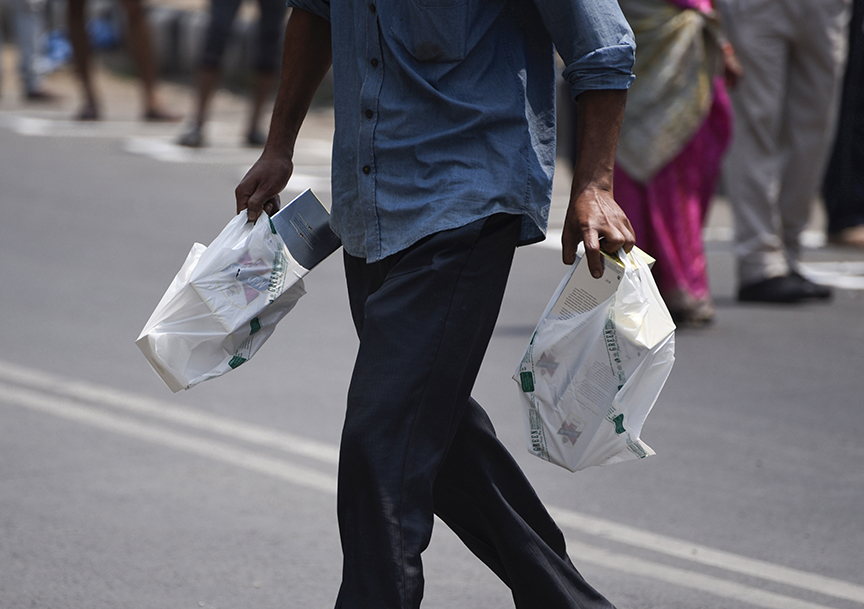
Man carries liquor after buying in a queue, during the nationwide lockdown to curb the spread of coronavirus, in Guwahati, Assam, India on Monday, April 13, 2020. (Photo by David Talukdar/NurPhoto via Getty Images)
The lockdown in the country has made people experience completely new scenarios, things they perhaps never imagined. One of them is the complete closure of liquor stores since Prime Minister Narendra Modi announced the nationwide lockdown from March 25.
People are languishing at home, memes are being passed through WhatsApp on the involuntary abstinence, tweets on how people are coping and reddit advice that one should start making their own alcohol are doing the rounds.
At one end of the spectrum are those just used to a drink or two to help them fall sleep at night. At the other end are alcoholics, those who are addicted to it, and in between those who believe in social drinking. All drinkers cite the failing economy, and hope the government acknowledges the large revenue the government gets from the sale of liquor to somehow open up this sector even amid the lockdown.
Demand is so high that reportedly a black market is developing. Incidence of liquor being smuggled into Delhi from Haryana is high, says DCP (PCR) Sharat Sinha. PCR crackdowns in Delhi from March 25 to April 28 have led to the arrest of 10 bootleggers. The quantity of illicit liquor seized? A whopping 8,585 litres. Along with this, PCR personnel were also able to seize 15 vehicles in excise act cases.
One of their busts was in the morning of April 8 when a PCR van was patrolling near Khaira- Dansa road when they noticed a person carrying a heavy bag. When the man tried to flee on spotting the cops, he was apprehended and 15 bottles of ‘Officer Choice’ illicit liquor was recovered
This is not to say that it is impossible to procure IMFL. People have been enquiring and discussing sources of alcohol from their homes on a social media platform. There is at least one case of a shop owner selling alcohol at double the cost in Delhi-NCR region.
Why the desperation? For those who are dependent on it, this is a frightening and physically trying time. Acknowledging this, the Kerala government did allow sale of liquor to those who can get a prescription from a doctor, after suicides were linked to withdrawal symptoms and addicts unable to get their fix. This doctor-approved liquor sale was short-lived as the Kerala High Court put it on hold. It asked for proof to show that withdrawal symptoms could be treated by administration of more alcohol. The government then decided it would instead advise people to go to de-addiction centres.
NIMHANS has observed and documented that more than 50% of all drinkers in India satisfy the criteria for hazardous drinking. The typical consumption pattern is one of heavy solitary drinking, involving predominantly spirits and usually more than five standard drinks per occasion.
Yet states want the re-opening of liquor shops as it is a huge source of revenue. The Tamil Nadu government earned a whopping Rs 31,157.83 crore from liquor sales in 2019-20; sales were projected to go to Rs 34,000 crore in 2020-21 but now the maths has gone for a six.
A fraction of what Tamil Nadu earns is raked in by the Delhi government. In December 2019, owing perhaps to the extreme cold and festivities, Delhi broke its own previous records with Rs 465 crore flowing into its coffers. But that was long ago.
For the two neighbouring states of Assam and Meghalaya, the past couple of days have been a cruel joke. They were allowed to open liquor stores on April 13. The next day PM Modi was back on TV screens announcing an extension of the lockdown till 3 May. And then on 15 April, the ministry of home affairs set out revised guidelines which include a “strict ban on sale of liquor”. The shutters were down again.
To have complete prohibition in the country is Mahatma Gandhi’s dream, but perhaps not for many Indians who are increasingly turning to the glass. WHO’s 2018 report has recorded this trend. While in 2005, alcohol per capita consumption (in litres of pure alcohol) was 2.4 litres, it increased to 4.3 litres in 2010 and scaled up to 5.7 litres in 2016.
Another state which wanted to allow delivery of alcohol to homes is West Bengal. This has not materialised, and most probably will not, keeping in mind the new injunction.
No wonder, the Confederation of Indian Alcoholic Beverage Companies (CIABC) has written to Commerce Minister Piyush Goyal, Health Minister Harsha Vardhan and chief ministers of all states to allow home delivery of alcoholic beverages.
CIABC and International Spirits and Wines Association of India (ISWAI) have asked the government to plan a phased opening of liquor shops outside Coronavirus hotspots for a longer span to ensure minimum consumer rush.
The letter further suggested that shops should be given licences for 3-4 home delivery workers and the government can control the frequency and the amount of liquor being delivered. Consumers can place orders online or via a phone call, along with identity proof for age verification.
Till now, though, there’s no word on what the coming days will bring.
Veteran actor Anil Kapoor reflects on four decades in cinema with gratitude as he takes…
Indian Youth Congress president held as police tighten security and invoke conspiracy and unlawful assembly…
Police said the Rajasthan native, undergoing depression treatment, jumped in front of a train at…
Neighbourhood cricket dispute turns violent, leaving a 15-year-old dead and three juveniles apprehended in west…
After receiving bomb threats, the police beefed up security arrangements at all the important installations,…
A Delhi Police head constable and two others were arrested for allegedly shooting dead a…